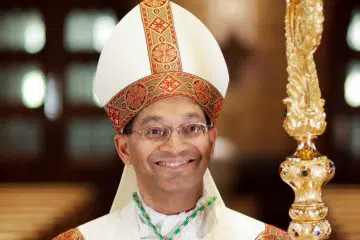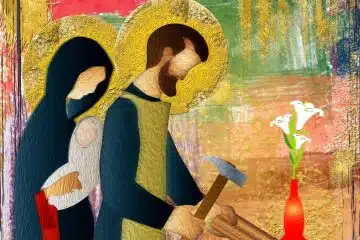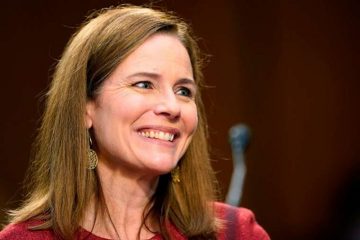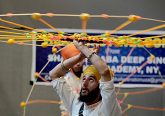South Sudanese bishop shares message of peace
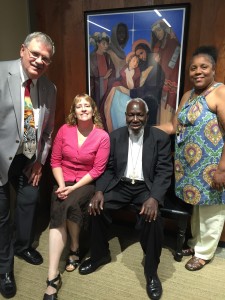
Bishop Emeritus Paride Taban of South Sudan shared his message of peace and hope on a visit to the archdiocese in late July.
During his time here, Bishop Taban visited the office of U.S. Rep. Steve Chabot, along with a delegation from the archdiocesan Catholic Social Action and Mission Offices. He also met with Archbishop Dennis M. Schnurr and had lunch with staff members from the archdiocese Central Offices, sharing his powerful witness to the Gospel as he seeks to forge peace among warring tribes in his home country.
Bishop Taban established Holy Trinity Peace Village in Kuron, Eastern Equatoria following his retirement from the Diocese of Torit in 2004, as a way of combating tribal conflicts and tribalism due to cattle raiding. It is common in the region and has led to hostility, insecurity and even deaths among communities in Kuron.
His goal is to spread a message of nonviolence, forgiveness and peace through the development of health clinics, schools and agriculture. Soccer, which he says is a “sport for peace,” is also a method he uses among the youth to help heal the trauma of decades of war that plagued the region.
“Many of the neighbors … called themselves ‘enemies,’” he said. “They tried to steal cows from each other. We wanted to make them become friends. We bring the youth who are rustling cattle to play soccer together. We started training members of the community to ‘self-police,’ so that if anyone collects an animal from the community, community members who have received some training collect the animal and bring it back. We started also to sensitize them about education. You don’t need to steal cattle. Go to school. Afterward, you will learn and train yourselves so you can buy your cows.”
“We started the village because we wanted to breakdown tribalism,” Bishop Taban.
“Now these people who called themselves enemies, call themselves friends. There are young people, growing together, building friendships. They are the future,” he said, noting that 81 families, some 5,000 people, currently call the Village home. “It is an oasis of peace in South Sudan.”
Bishop Taban is hopeful the Peace Village will evolve into a peace academy by sharing its principals with others outside its boundaries. The bishop has invited pastors, chiefs and other leaders from across the 28 South Sudanese states to witness firsthand his model for peace. His hope is that they return home to establish Peace Villages in their own communities.
Each person can be a peacemaker, Bishop Taban believes, by incorporating these 28 words and phrases into his or her prayer as he does: “love, joy, peace, patience, compassion, sympathy, kindness, truthfulness, gentleness, self control, humility, poverty, forgiveness, mercy, friendship, trust, unity, purity, faith and hope, I love you, I miss you, thank you, I forgive, we forget, together, I am wrong, I am sorry.”
If these words enter our hearts, we can each become peacemakers and bring peace to the whole world,” he said.
Said Mike Gable, director of the Mission Office, “While Bishop Taban, of course, pleads with citizens in the U.S. and other powerful nations to work for peaceful resolutions in South Sudan, I was struck by his blunt statement: ‘My own people must learn to turn away from revenge and refuse to take military weapons that being pushed from outside profiteers. If we learn to say ‘no’ to violence as a solution and replace hatred with love, the killing will stop.’ And so I likewise impressed by his concrete efforts of developing his Holy Trinity Peace Village in Kuron which brings together families of various tribes, religions, and races to demonstrate better farming practices, to teach conflict resolution methods, and to offer a formal education. Here is a servant of God who talks the talk and walks the walk!”


